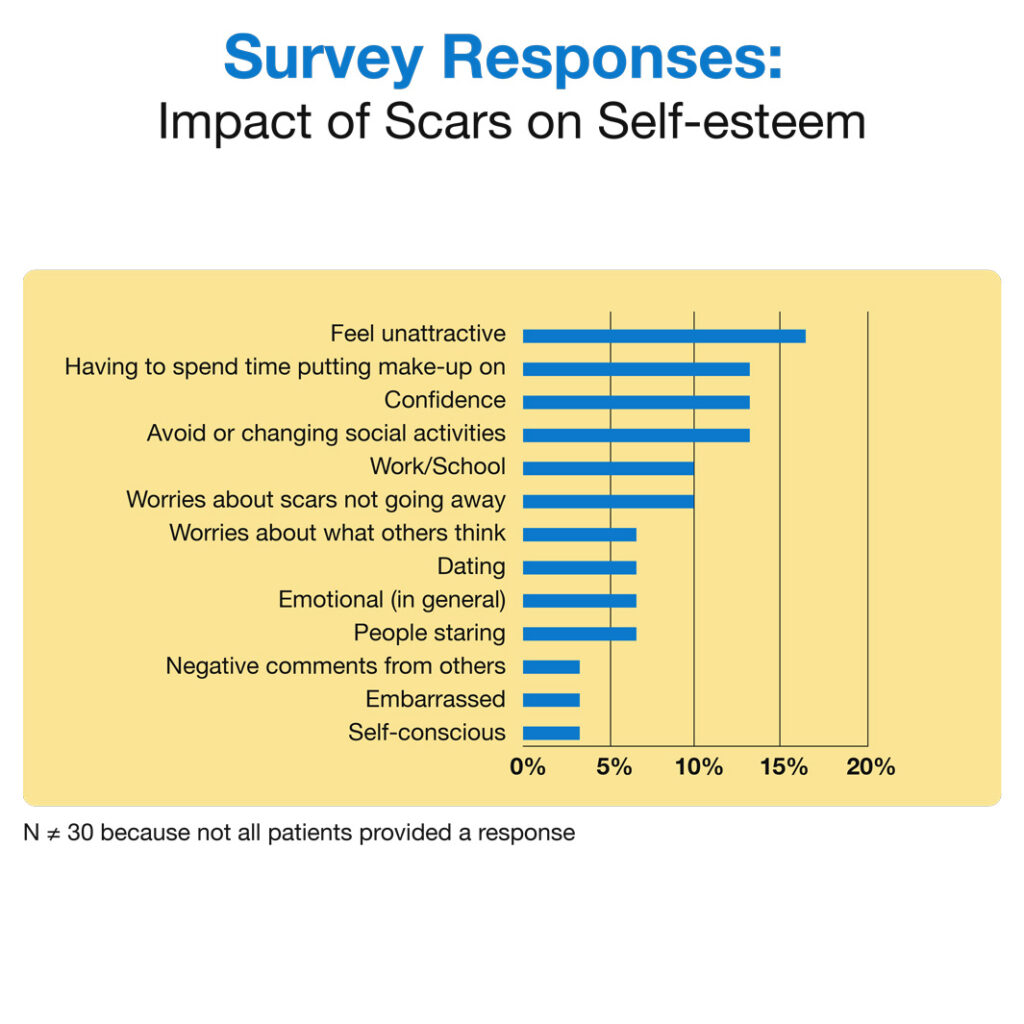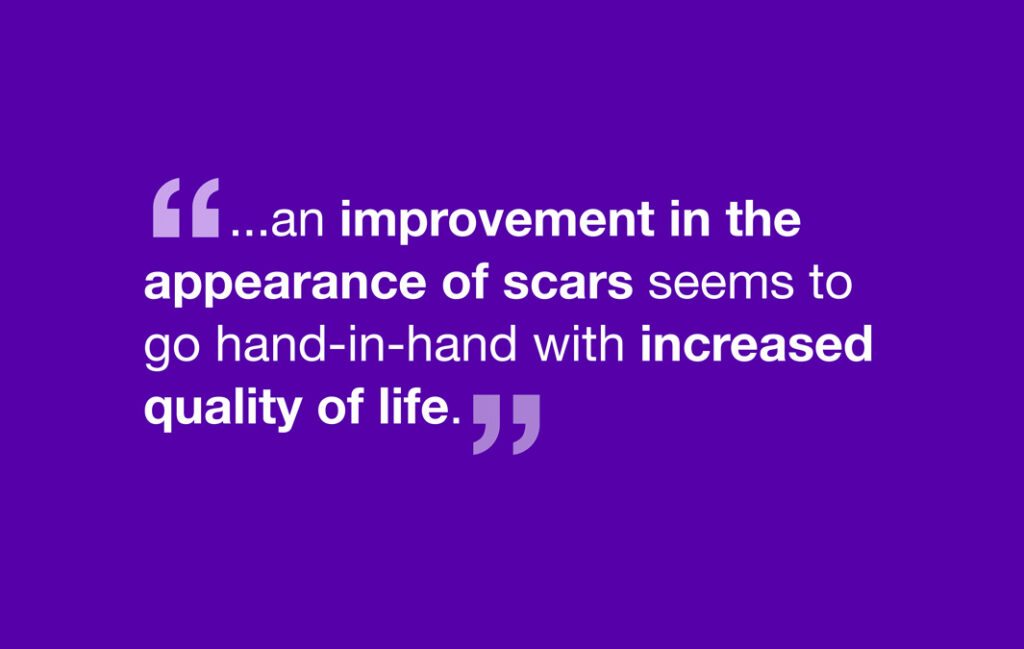Having Acne Scars Can Lower Self-esteem. If This Is an Issue for You, Treat Your Acne Early to Prevent New Scars, Explore Scar Repair Options, and Work Toward Self-acceptance.

The Essential Info
Acne often leaves behind scars. Research shows that having acne scars can damage self-esteem, making some people feel less attractive and causing them to hold back in social settings.
If your scars are affecting your self-esteem, here’s what you can do:
- Treat your acne to prevent new scars
- Research which scar repair options may be best for you
- Work toward accepting that some scars may remain, but they don’t have to dictate how you see yourself

The Science
- Studies on How Acne Scars Affect Self-esteem
- Treating Acne Scars May Help with Self-esteem
- What to Do If Your Scars Are Affecting Your Self-esteem
Research shows that having acne can lead to low self-esteem, which can manifest as embarrassment, self-consciousness, and a lack of self-confidence.1,2 When it comes to scars left over after acne heals, fewer studies have looked at how these scars impact self-esteem, but common sense suggests that acne scars, especially those on the face, can also hamper self-image.3 The limited research we have on this topic supports this prediction.
Studies on How Acne Scars Affect Self-esteem
Four studies have investigated how having acne scars impacts quality of life. Unsurprisingly, three of the four studies found that acne scars tend to worsen quality of life, while the fourth was inconclusive. Let’s take a closer look.
Study #1

In this study, published in the journal Dermatology and Therapy in 2016, researchers interviewed 30 patients with acne scars in the U.S. about the impact of those scars on the patients’ view of themselves as well as on their social life.
The image below shows the most common responses. As we can see, for some patients, acne scars affected their confidence and made them feel embarrassed and self-conscious.4

Study #2

This study was published in The Journal of Dermatology in 2015. The researchers examined 240 Japanese patients with acne, most of whom also had acne scars.
The patients then filled out a short questionnaire that assesses the impact of skin conditions such as acne scars on quality of life. We should note that only one question in the questionnaire specifically addresses self-esteem.
They found that patients with acne scars scored significantly higher on the questionnaire than patients without acne scars, meaning that acne scars negatively affect patients’ quality of life.5
Study #3

This study was published in the Journal of Cutaneous and Aesthetic Surgery in 2015. The researchers examined 100 patients with acne scars in Singapore and, similar to the second study, asked them to complete the same questionnaire.
Out of 100 patients:
- 36% were self-conscious about their acne scars
- 24% felt that their acne scars were negatively affecting their social life
The average score of the patients with acne scars on the questionnaire indicated a negative impact of scars on the patients’ quality of life.
Putting together these findings, the researchers wrote, “Our study showed that post-acne scars have a significant negative effect on the [quality of life] of young adults.”6
Study #4

This study was published in The Journal of Dermatology in 2005. The researchers looked at 108 patients with acne. As in the previous two studies, the patients completed the DLQI questionnaire as well as another questionnaire called the Acne Quality of Life Scale (AQOLS).
The researchers then compared the responses of patients with acne scars to those without acne scars. On both questionnaires, people with acne scars and people without acne scars answered similarly to each other. In other words, these two measures of quality of life were similar between people with acne scars and those without scars.
Rather than concluding that scars don’t affect quality of life, the researchers concluded that these two short questionnaires may not be sensitive enough to reveal the impact of acne scars. They wrote, “ In conclusion, these scores are not good enough to evaluate acne patients’ quality of life.”7
Treating Acne Scars May Help with Self-esteem

The limited evidence we have so far suggests that acne scars do, indeed, tend to lower a person’s self-esteem. Common sense also tells us that treating and improving the scars should help with self-esteem.
One other study has looked at how treating acne scars affects self-esteem. As we might expect, the study found that an improvement in the appearance of scars seems to go hand-in-hand with increased quality of life, part of which is improved self-esteem.8
Expand to read details of study

This study was published in the Indian Journal of Dermatology in 2018. Fifty-five patients with acne scars participated in the study. The researchers treated the patients’ scars and asked the patients to complete the DLQI questionnaire before and after the scar treatment to assess whether the treatment improved their quality of life. The patients were separated into two groups, which received different scar treatments:
- Group 1 received microneedling treatment only.
- Group 2 received microneedling treatment and platelet-rich plasma injections.
We should note that doctors often combine different types of scar treatments for better results.
At the end of the study, both groups improved both in scar appearance and in their quality of life scores. However, Group 2 showed a greater improvement in the appearance of scars and in quality of life.8
A variety of scar treatments are available, including laser therapy, chemical peels, and fillers, among others.9
While scar treatments can improve the appearance of acne scars, there is no treatment that can fully remove them. Therefore, it’s important to prevent scars from forming in the first place as much as possible by treating your acne early. Not surprisingly, research shows that successful acne treatment also improves patients’ quality of life.10
What to Do If Your Scars Are Affecting Your Self-esteem
If you’re ashamed of your skin, you’re not alone. Unfortunately, like most societies on earth, our society places a premium on looks, which can lead to negative perceptions of skin conditions like acne scars.11-13
Here are a few things you can do if you find that your scars are lowering your self-esteem:
- Treat your acne early: Treating your acne early can help prevent new scars from forming. You can see a full list of acne treatments here.
- Educate yourself on scar treatments: Explore scar treatment options and research which ones might be best for you. Keep in mind that a combination of two or more scar treatments may produce the best results.
- Work toward self-acceptance: Nobody is perfect, and acne scars in particular are very common. In fact, there is a whole acne positivity movement that aims to normalize acne. While you can improve the appearance of your scars, don’t put your life on hold until you have achieved perfect skin. Accepting that some scars will likely remain can free you up from constantly worrying about it and give you the space to pursue things that are meaningful to you.
References
- Self-esteem. Wikipedia. Available at: https://en.wikipedia.org/wiki/Self-esteem
- Hazarika, N. & Archana, M. The psychosocial impact of acne vulgaris. Indian J Dermatol. 61, 515-20 (2016). https://pubmed.ncbi.nlm.nih.gov/27688440/
- Ngaage, M. & Agius, M. The psychology of scars: A mini-review. Psychiatr Danub. 30 (Suppl 7), 633-638 (2018). https://pubmed.ncbi.nlm.nih.gov/30439862/
- Layton, A., Dréno, B., Finlay, A. Y., Thiboutot, D., Kang, S., Lozada, V. T., Bourdès, V., Bettoli, V., Petit, L. & Tan, J. New patient-oriented tools for assessing atrophic acne scarring. Dermatol Ther (Heidelb). 6, 219-33 (2016). https://pubmed.ncbi.nlm.nih.gov/26886873/
- Hayashi, N., Miyachi, Y. & Kawashima, M. Prevalence of scars and “mini-scars”, and their impact on quality of life in Japanese patients with acne. J Dermatol. 42, 690-6 (2015). https://pubmed.ncbi.nlm.nih.gov/25916427/
- Chuah, S. Y. & Goh, C. L. The impact of post-acne scars on the quality of life among young adults in Singapore. J Cutan Aesthet Surg. 8, 153-8 (2015). https://pubmed.ncbi.nlm.nih.gov/26644739/
- Ilgen, E. & Derya, A. There is no correlation between acne severity and AQOLS/DLQI scores. J Dermatol. 32, 705–10 (2005). https://pubmed.ncbi.nlm.nih.gov/16361712/
- Porwal, S., Chahar, Y. S. & Singh, P. K. A comparative study of combined dermaroller and platelet-rich plasma versus dermaroller alone in acne scars and assessment of quality of life before and after treatment. Indian J Dermatol. 63, 403-408 (2018). https://pubmed.ncbi.nlm.nih.gov/30210162/
- Kravvas, G. & Al-Niaimi, F. A systematic review of treatments for acne scarring. Part 1: Non-energy-based techniques. Scars Burn Heal. 3, 2059513117695312 (2017). https://pubmed.ncbi.nlm.nih.gov/29799567/
- Chilicka, K. Maj, J. & Panaszek, B. General quality of life of patients with acne vulgaris before and after performing selected cosmetological treatments. Patient Prefer Adherence. 11, 1357-1361 (2017). https://pubmed.ncbi.nlm.nih.gov/28831246/
- Dréno, B., Tan, J., Kang, S., Rueda, M.J., Torres Lozada, V., Bettoli, V. & Layton, A. M. How people with facial acne scars are perceived in society: an online survey. Dermatol Ther (Heidelb). 6, 207-18 (2016). https://pubmed.ncbi.nlm.nih.gov/27090421/
- Tuckman, A. The potential psychological impact of skin conditions. Dermatol Ther (Heidelb). 7 (Suppl 1), 53-57 (2017). https://pubmed.ncbi.nlm.nih.gov/28150109/
- Loh, K. C., Chan, L. C. & Phang, L. F. Perceptions and psychosocial judgement of patients with acne vulgaris. Med J Malaysia. 75, 18-23 (2020). https://pubmed.ncbi.nlm.nih.gov/32008014/
 Acne.org Products
Acne.org Products